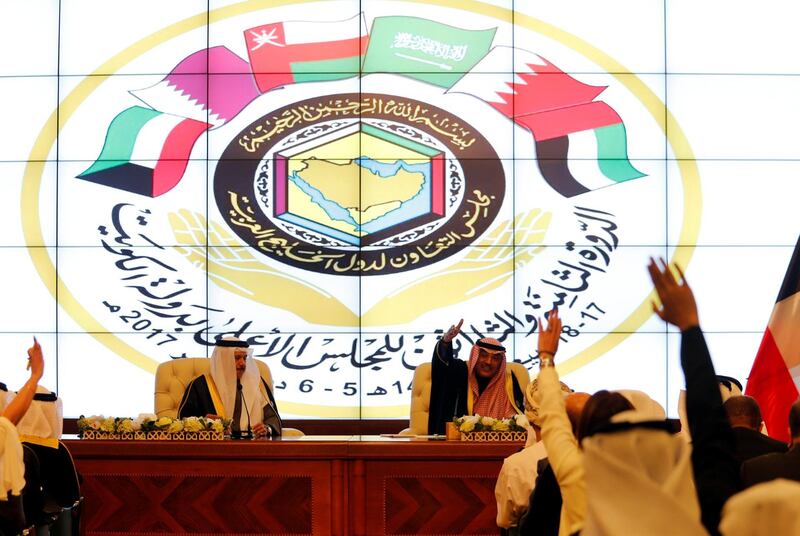It was cut short by a day and may have had air of anticlimax about it, but this year's Gulf Cooperation Council summit was successful in at least one respect: it brought together representatives from the six-nation bloc for the first time since the Qatar crisis erupted six months ago.
Invitations to the summit no doubt came as both a surprise and relief for member states. Failure to hold the 38th summit — and there were some doubts as to whether it would take place — could have prolonged the crisis “for years”, as Dr Anwar Gargash, Minister of State for Foreign Affairs, warned at the onset of the six-month row.
However, even Dr Gargash — one of the most vocal officials on the subject of Qatar — declared the summit was "a very positive step" in sensitive times.
On Wednesday, the day after the summit closed, he tweeted that "the success of Kuwait' summit confirms that the GCC will continue and prevail despite its crisis with Qatar".
نجاح قمة الكويت في تأكيدها أن مسيرة مجلس التعاون مستمرة وستتجاوز أزمة قطر، وأهميتها أنها لم تكن مخرج للدوحة لتفادي المراجعة والتراجع عن الضرر الذي تسببت به.
— د. أنور قرقاش (@AnwarGargash) December 6, 2017
But, he added, "only courage and wisdom will ensure the retraction of harmful policies in the region".
الإعتقاد الواهم أن أزمة المرتبك حلها لن يتطلب المراجعة وتغيير السلوك يتبدد مع كل باب موصد و مع تهميش الملف، الشجاعة والحكمة في مراجعة تضمن تراجعه عن سياساته الضارة بالمنطقة.
— د. أنور قرقاش (@AnwarGargash) December 6, 2017
The summit placed Qatar's emir and representatives of the three GCC member states boycotting Doha — the UAE, Saudi Arabia and Bahrain — in the same room for the first time since June.
_____________
Read more:
[ GCC Summit: Second day cancelled amid row ]
[ Beyond the Headlines: GCC summit and Trump's Jerusalem announcement ]
[ Sheikh Khalifa forms joint military alliance between UAE and Saudi Arabia ]
Editorial: The GCC is a symbol of unity and strength in times of trouble
_____________
And pains were taken to make sure they were seen gathering together, with two busloads of journalists from Japan to North America installed outside Tahrir Hall in Kuwait City's Al Bayan Palace to watch the four men exchanging warm gestures of friendship with their host, the emir of Kuwait. At one point, Qatar's Emir Sheikh Tamim Al Thani — all two metres of him — squatted next to his Kuwait counterpart and held a whispered conversation moments before the closing address. Less than a minute later, Dr Gargash did exactly the same.
The attendance of all six countries, albeit not all represented by their heads of state as is typical, was partly out of respect for the Kuwaiti emir, Sheikh Sabah Al Ahmed, who urged the countries to engage in unity, and assured the representatives of his confidence in the resilience of the 38-year old institution's ability to overcome challenges. Many say it is due to his ability as a skilled bridge-builder in the Gulf that the summit took place at all; he played a key role in resolving the previous crisis in 2014 and is regarded as the best hope now for resolving the current rift.
The presence of all six member states in Kuwait is possibly also a sign of their willingness to engage in dialogue, even after the UAE, Saudi Arabia and Bahrain said they would not attend the summit unless Doha changed its ways.
Unlike meetings held by other more transparent regional blocs, those conducted by the GCC are more cryptic. They happen behind closed doors, away from outside scrutiny.
Historically, the annual summits are not known for producing landmark decisions or swift progress. Rather their import lies in the fact that the six states get together to align their interests, and this year's summit seemed to achieve that.
Many believed the Qatar crisis would consume the closed session agenda. As it turned out, sources said it focused on Kuwait's appeal for the GCC to be the platform for a solution — an outcome that the 88-year-old Kuwaiti emir is convinced will emerge.
The evidence for this came in a statement at the end of the conference, calling for the formation of a committee to resolve the crisis. Officials at the summit said the move could precede a reworking of the GCC’s charter to include a more robust conflict resolution mechanism.
Yemen also featured prominently on the agenda, with Sheikh Sabah Al Khaled, Kuwaiti minister of foreign affairs, saying that “peace in Yemen can only be found through political means”.
Kuwait was host to last year's round of peace talks, which Saudi Arabia claimed were undermined by Iranian influence. With the death of Yemen's former — but still powerful — president on Monday this week, another round of talks seems possible and it is likely that Kuwait will again host them.
The Kuwaiti foreign minister also took a harder stance on Iran, urging the need for “all countries to adhere to and respect state sovereignty”.
The point was clearly made that an increasingly menacing Iran, just to the east of the Arabian Gulf, makes GCC unity even more essential. The very reason for the GCC's formation in 1981 was at least in part to be a counterbalance to the growing threat of Iran's foreign policy, and its intention to export its Islamic Revolution to the rest of the Middle East.
Some argue that Kuwait and Oman — coincidentally the two mediating nations in the Qatar crisis — need the GCC more than the other members, but with Tehran’s sights set on exerting its influence more aggressively, the bloc — and a united bloc — is needed now more than ever before.





